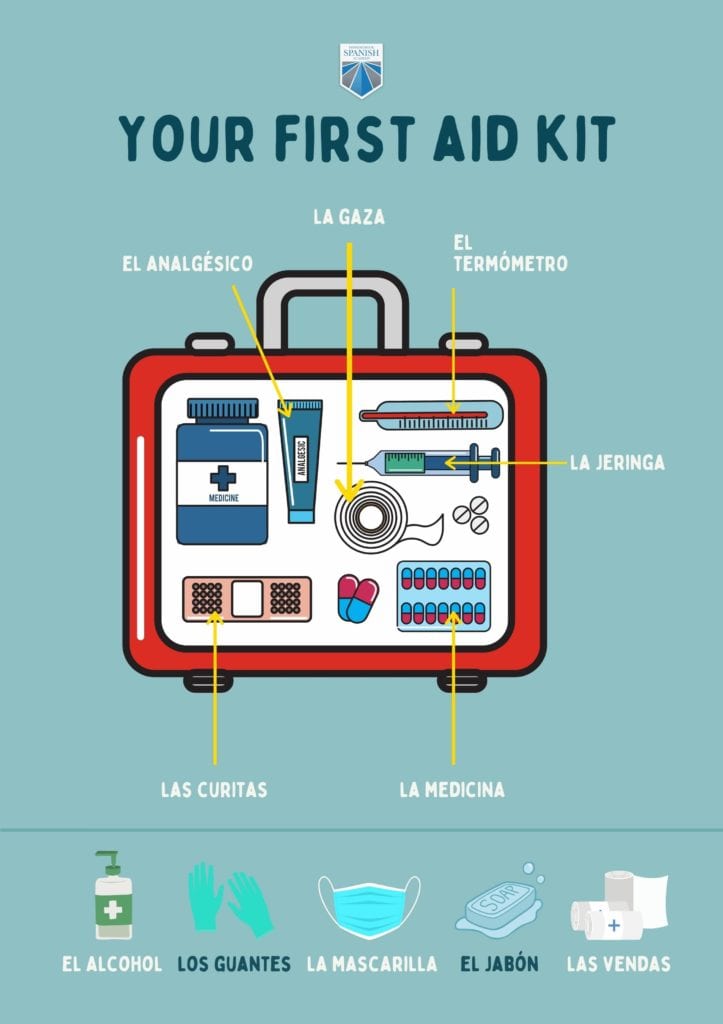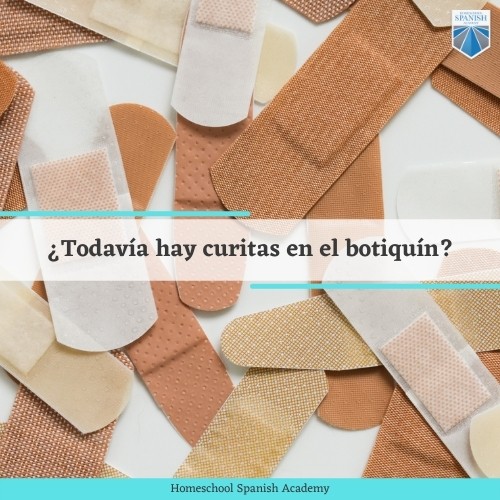
Emergency Vocabulary: Your First Aid Kit in Spanish
If this is an emergency, call 911; if not, sit back, relax, and get ready to learn about first aid kits in Spanish. This will come in handy if you’re ever dealing with an accident in Latin America or Spain.
Johnson and Johnson started selling the first commercial first aid kit back in 1888. Since then, these kits have helped countless people mend their wounds.
It’s important to have a first aid kit in your home in case of accidents. That’s why, in this post I provide Spanish vocabulary not only to talk about a first-aid kit in Spanish, but also to discuss wounds you might have or natural disasters you might experience—but hopefully you won’t!
Contents of a First Aid Kit in Spanish

What is the translation of “first aid kit” in Spanish? El botiquín (o kit) de primeros auxilios—or you can simply call it botiquín.
How do you say band-aid in Spanish? What does a kit de primeros auxilios include? To find out, study this basic first aid kit list:
| English | Spanish |
| gauze | la gaza |
| bandages | las vendas |
| soap | el jabón |
| alcohol | el alcohol |
| tweezers | las pinzas |
| scissors | las tijeras |
| pins | los alfileres |
| cotton | el algodón |
| thermometer | el termómetro |
| plastic gloves | los guantes de plástico |
| painkillers | los analgésicos |
| water | el agua |
| blanket | la sábana |
| mask | la mascarilla |
| splint | la férula |
| sticking plaster | el esparadrapo |
| band-aids | las curitas |
| disinfecting wipes | las toallitas desinfectantes |
| ointment | la pomada o el ungüento |
| antibiotics | los antibióticos |
Why do we use these things? To curar (cure), tratar (treat) or sanar (heal) las heridas (wounds).
Using a First Aid Kit in Spanish: Example Sentences
Por favor, saca las toallitas desinfectantes del botiquín.
Please take the disinfecting wipes out of the kit.
¿Todavía hay curitas en el botiquín?
Are there still band-aids in the kit?
El alcohol va a servir para desinfectar la herida.
The alcohol will work to disinfect the wound.
Disculpe, ¿tiene analgésicos en su botiquín? Me duele mucho la cabeza.
I’m sorry, do you have any painkillers in your (first-aid) kit? My head hurts a lot.
Para esa quemadura podemos usar un poco de ungüento.
We can use a little ointment for that burn.
Usemos el termómetro del botiquín para medir la temperatura.
Let’s use the thermometer from the (first-aid) kit to measure their temperature.

Accidents that Require a First-Aid Kit in Spanish
Accidents happen. When they do, it’s ideal to be prepared to talk about them in Spanish. The following verbs are useful:
- To break – romper, romperse, quebrar, quebrarse
- To slip – resbalar, resbalarse
- To hit – golpear, golpearse
- To hurt – lastimar, lastimarse
- To dislocate – dislocar, dislocarse
- To twist – torcer, torcerse
- To tear – rasgar, rasgarse
- To swell – hinchar, hincharse
- To drown or to choke – ahogar, ahogarse
- To stick – trabar, trabarse
- To bleed – sangrar
- To hurt (or feel pain) – doler
- To feel a burning sensation – arder
- To bite – morder, morderse
- To pull – halar, jalar
- To faint – desmayarse
- To swallow – tragar, tragarse
- To open – abrir, abrirse
- To sprain – esguinzarse
- To cut – cortar, cortarse
- To fall – caer, caerse
PRO TIP: While abrir and abrirse are similar, the verb abrirse is used more often in this context. It refers to opening a wound on oneself.
Example Sentences
Me rompí un dedo jugando basquetbol.
I broke my finger playing basketball.
¿Te golpeaste?
Did you hurt (or hit) yourself?
Mi hermano se resbaló, se cayó y se abrió la mano porque cayó en piedras.
My brother slipped, fell and cut-open his hand because he fell on rocks.
Nos cortamos con el cuchillo mientras picamos cebollas.
We cut ourselves with the knife while we were chopping onions.
Se rasgaron las pantorrillas.
You tore your calves.
Se van a ahogar si siguen comiendo tan rápido.
They are going to choke if you keep eating that fast.
PRO TIP: Remember that the indirect pronoun for él, ella, ustedes, and ellos is the same one: se. To learn more, read about Indirect Object Pronouns in Spanish.
Types of Wounds to Cure with a First-Aid Kit in Spanish
Nouns come from verbs (or vice versa), and some of the verbs I just shared with you turn into nouns. Check them out in this chart!
| English | Spanish |
| break | la rotura, la quebradura |
| slip | el resbalón |
| hit | el golpe |
| dislocation | la dislocación |
| twist | la torcedura |
| tear | la rasgadura |
| swelling | la hinchazón |
| choking, drowning | el ahogo |
| bleeding | el sangrado |
| pain | el dolor |
| burning sensation | el ardor |
| bite | la mordedura |
| pull | el jalón |
| fainting | el desmayo |
| sprain | el esguince |
| cut | la cortadura |
| fall | la caída |
| burn | la quemadura |
| wound | la herida |
| injury | la lesión |
PRO TIP: Remember that the past participle (el participio pasado) of romper is irregular and is roto or rota if you use it as an adjective (not rompido).
Example Sentences
Su cortadura es leve; el alcohol y las vendas del botiquín servirán.
You have a mild cut; the alcohol and bandages from the first-aid kit will do.
La pomada del botiquín va a aliviar su quemadura.
The ointment in the first-aid kit is going to relieve your burn.
El golpe que me di en la cabeza hizo que me desmayara.
The hit I took to the head made me faint.

How to Talk About Cures in Spanish
The effects of accidents can be usually fixed, repaired, or healed. As we say in Spanish “lo único que no tiene solución es la muerte” (the only thing that doesn’t have a solution is death).
Check out these relevant verbs:
- To cure – curar. curarse
- To heal – sanar
- To fix – arreglar
- To repair – reparar
- To relieve – aliviar, aliviarse
- To work – servir
- To function – funcionar
- To close – cerrar
- To disinfect – desinfectar, desinfectarse
- To sew – coser
- To apply – aplicar
- To stop – detener
- To cauterize – cauterizar
- To clean – limpiar
Example Sentences
La pomada puede arreglarlo.
The ointment might fix it.
El analgésico va a aliviarme el dolor de la torcedura de tobillo.
The painkiller is going to relieve the pain of my ankle sprain.
Necesitamos desinfectar la herida.
We need to disinfect the wound.
Emergency Vocabulary: Other Types of Emergencies in Spanish
First-aid kits are designed to respond to accidents but also emergencies. How do you say “emergency” in Spanish? La emergencia.
How about natural disasters? Los desastres naturales.
Find the most common natural disasters here:
| English | Spanish |
| earthquake | el terremoto |
| tremor | el temblor |
| flood | la inundación |
| fire | el incendio |
| hurricane | el huracán |
| cyclone | el ciclón |
| tornado | el tornado |
| storm | la tormenta |
| thunderstorm | la tormenta eléctrica |
| eruption | la erupción |
| tsunami | el maremoto o tsunami |
| landslide | el deslizamiento de tierra |
| crumbling | el derrumbe |
| avalanche | la avalancha |
| sinkhole | el sumidero |
| wildfire | el incendio forestal |
| blizzard | la tormenta (de nieve) |
| drought | la sequía |
| heat wave | la ola de calor |
En California y en Chile hay muchos terremotos.
In California and Chile, there are many earthquakes.
En Hawaii hay muchos volcanes que hacen erupción.
In Hawaii, there are many volcanoes that erupt.
Las tormentas de nieve en Indiana son muy fuertes.
Blizzards in Indiana are very strong.
Lamentablemente, en el 2004 hubo un tsunami en Indonesia.
Sadly, in 2004 there was a tsunami in Indonesia.
El año pasado hubo muchos incendios forestales en Australia.
Last year, there were many wildfires in Australia.
En el 2010, se abrió un sumidero en la Ciudad de Guatemala.
In 2010, a sinkhole opened in Guatemala City.

Types of Responders in Spanish
Thankfully there are people who devote their careers to responding to natural disasters and other emergencies. Here are the names of these noble occupations in Spanish.
| English | Spanish |
| rescuer | el rescatista |
| paramedic | el o la paramédico |
| doctor | el doctor o la doctora |
| police officer | el o la oficial de policía |
| firefighter | el bombero |
| nurse | el enfermero o la enfermera |
| coast guard | la guardia costera |
| army | el ejército |
| soldier | el o la soldado |
| lifeguard | el salvavidas |
Vehicles that Responders Use in Spanish
It is also important to get to know what to call the vehicles that responders use.
| English | Spanish |
| rescue vehicle | el vehículo de rescate |
| ambulance | la ambulancia |
| police car | el auto de policía |
| fire truck | el camión de bomberos |
| boat | el bote o lancha |
| truck | el camión |
| chopper or helicopter | el helicópterog |
Get to Safety in Spanish
Here are some useful sentences and dialogues to talk about specific scenarios.
Por favor, describame su emergencia.
Please describe your emergency to me.
¡Mi calle está inundada!
My street is flooded!
¡Hubo un derrumbe! Hay personas atrapadas. Necesitamos rescatistas.
There was a landslide! There are people trapped. We need rescuers.
Una persona se está ahogando. Necesitamos un salvavidas.
A person is drowning. We need a lifesaver.
Llamen a una ambulancia, a los paramédicos; hay gente herida.
Call an ambulance, call the paramedics; there are wounded people.
El terremoto causó un gran desastre.
The earthquake caused a big disaster.
¡Una casa se incendia! ¡Que vengan los bomberos a extinguirla!
There’s a house on fire! Let the firefighters come and extinguish it!
Practice Your Spanish!
Más vale prevenir que lamentar.
It’s better to be safe than sorry.
Stay safe out there!
If you want to communicate more effectively with other people, especially in emergency situations, it’s great to learn Spanish. With fluency, you’ll be able to express yourself and others will be able to understand—even in a stressful situation. Practice your Spanish with our friendly Guatemalan teachers at Homeschool Spanish Academy. Sign up for a free, 1-to-1 class and expand your emergency vocabulary even further! Become one of more than 437 million people who already speak Spanish worldwide in approximately 480 hours!

Ready to learn more Spanish vocabulary? Check these out!
- ‘How Much Is It?’ in Spanish: A Guide to Travel and Shopping
- Familial Bonds: Expressing ‘Sister-in-Law’ in Spanish and Family Vocabulary
- 100 Easy Spanish Words for True Beginners
- Earth Day Projects for Kids + Spanish Earth Day Vocabulary
- How to Talk About the Temperature in Spanish: Fahrenheit, Celcius, and Descriptions
- Car Parts Spanish Vocabulary List: Learn Using Pictures
- Top 15 New Year’s Resolutions in Spanish
- Talk About Hurricanes And The Weather in Spanish
- 9 Tips for Learning How to Learn Two or More Languages at Once - January 20, 2023
- The History and Tradition of Las Cabañuelas - December 26, 2022
- 10 Ways to Learn How to Think in Spanish - December 25, 2022




